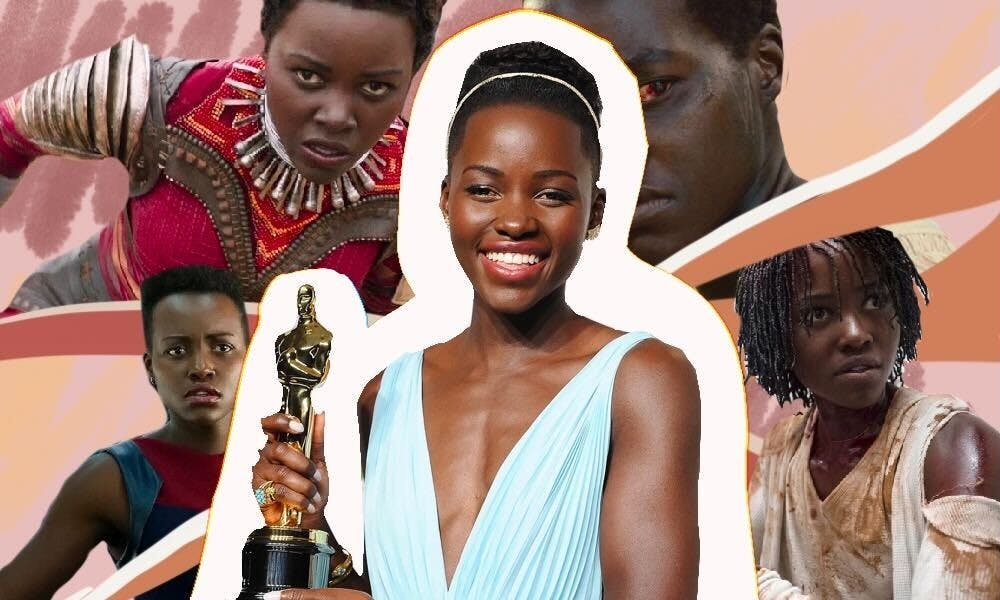Nearly a decade ago, Lupita Nyong’o was awarded an Academy Award for her first feature film role as Patsey in 12 Years a Slave. Overnight, Nyong’o went from just another talented actress to a bonafide Hollywood star. Winning an Oscar is a massive achievement in Hollywood, something that boosts someone’s career to new heights. Yet when comparing Nyong’o to her fellow Best Supporting Actress winners from the past decade like Regina King or Laura Dern, who have experienced career highs directing or starring in coveted roles, Nyong’o’s filmography seems minor and empty. Why has Hollywood not given Nyong’o the same opportunities?
In the nine years since receiving the top award in Hollywood, Nyong’o has starred in ten full–length films, including the critically–acclaimed and landmark Black Panther, Us, and Star Wars: The Force Awakens. But of these ten, four have been motion–capture or voice–over roles. Meanwhile, Nyong’o was on the Vogue cover four times in the span of three and a half years, a frequency not matched by other Vogue stars, such as Rihanna or Michelle Obama. Besides Vogue, Nyong’o has been on the cover of British Vogue, Vanity Fair, and many other popular magazines.
At first, it’s confusing why Nyong’o has been in few film projects since winning her Oscar, after garnering reviews that labeled her performance in 12 Years a Slave as a “revelation” and “quite the most bold feature debut by an actress in recent memory.” Nyong’o has shown her range too, especially in the horror–thriller Us, where she plays two versions of herself (one sane and the other psycho). Nyong’o is also a Yale School of Drama graduate, which boasts alumni like Meryl Streep. But Nyong’o’s dried–up career boils down to a very simple truth that Hollywood has tried to hide with her frequent magazine covers: her darker skin has made her less in–demand than other actresses, whether Black or white. Nyong'o’s lack of roles, despite giving incredible performances whenever given the chance, is the result of Hollywood’s long–standing exclusion of darker–skinned actresses. This is an example of colorism, which is the prejudice against people who have a darker skin tone compared to those with a lighter skin tone within a racial or ethnic group.
Nyong'o has spoken about her own experiences regarding colorism at home in Kenya and Hollywood. “I definitely grew up feeling uncomfortable with my skin color because I felt like the world around me awarded lighter skin,” Nyong'o says in an interview with BBC Newsnight.
In a 2019 interview with Oprah Winfrey, Nyong'o acknowledges the stereotypes surrounding dark skin in Hollywood. “I recently had a makeup artist say to me, oh well, you know, your skin can take anything, it’s so tough…[but] I have very sensitive skin. It’s just misunderstood,” Nyong’o says.
In the same BBC Newsnight interview, Nyong’o also discusses how her skin color has prevented her from booking projects, mentioning that she once auditioned for a TV show and was told she was “too dark to be on television.” If an Oscar winner is being subjected to colorist ideals, one can only imagine the discrimination facing actresses with less exposure or popularity.
Oscar–winning actress Viola Davis, considered one of the greatest actors of the twenty–first century by the New York Times, has also given voice to her experience with colorism in Hollywood. Even with a Juilliard education and roles in theater on– and off–Broadway, Davis experienced countless rejections that were at least partially due to her darker skin. It was only when she got the part of Annalise Keating in ABC’s How to Get Away With Murder that she finally became the leading lady.
Davis spoke to the New York Times prior to How To Get Away with Murder's premiere, questioning whether audiences would embrace her and her character, who are both women "of color, of a certain age and a certain hue."
“I don’t see anyone on TV like me in a role like [How to Get Away with Murder]. And you can’t even mention Halle Berry or Kerry Washington,” Davis says, referring to two actresses with lighter skin.
Light–skinned Black actresses have also reflected on the very real issue of colorism. For example, Zendaya recognizes that she’s Hollywood’s “acceptable version of a black girl,” pointing out the varying degrees of discrimination faced by Black women in the modeling and acting industries.
However, Hollywood’s history of sidelining darker–skinned actresses has not stopped Nyong’o from pursuing her own projects, including outside of acting. She currently produces TV shows, serves on philanthropic committees like Michael Kors’ “Watch Hunger Stop” campaign, and is a member on The Africa Center’s board of trustees. In 2019, Nyong’o wrote a New York Times Best Seller picture book called Sulwe, which is about a Kenyan girl who shares many of Nyong’o’s own childhood experiences of dealing with colorism and self-esteem; Netflix has plans to adapt Nyong’o’s children’s book into an animated musical.
You’ll next see Lupita Nyong’o as Nakia in Black Panther: Wakanda Forever, which is projected to be a massive hit. But after that, Nyong’o has no more acting projects lined up, or at least none that have been publicly announced. It makes no sense, considering she’s given some of the most memorable performances of the last decade. If Hollywood doesn't want to offer a role to an actress, it should be because they aren't suitable for the role, not because they have darker skin. In order to truly advance Black representation, Hollywood needs to stop practicing colorism in its casting decisions.







